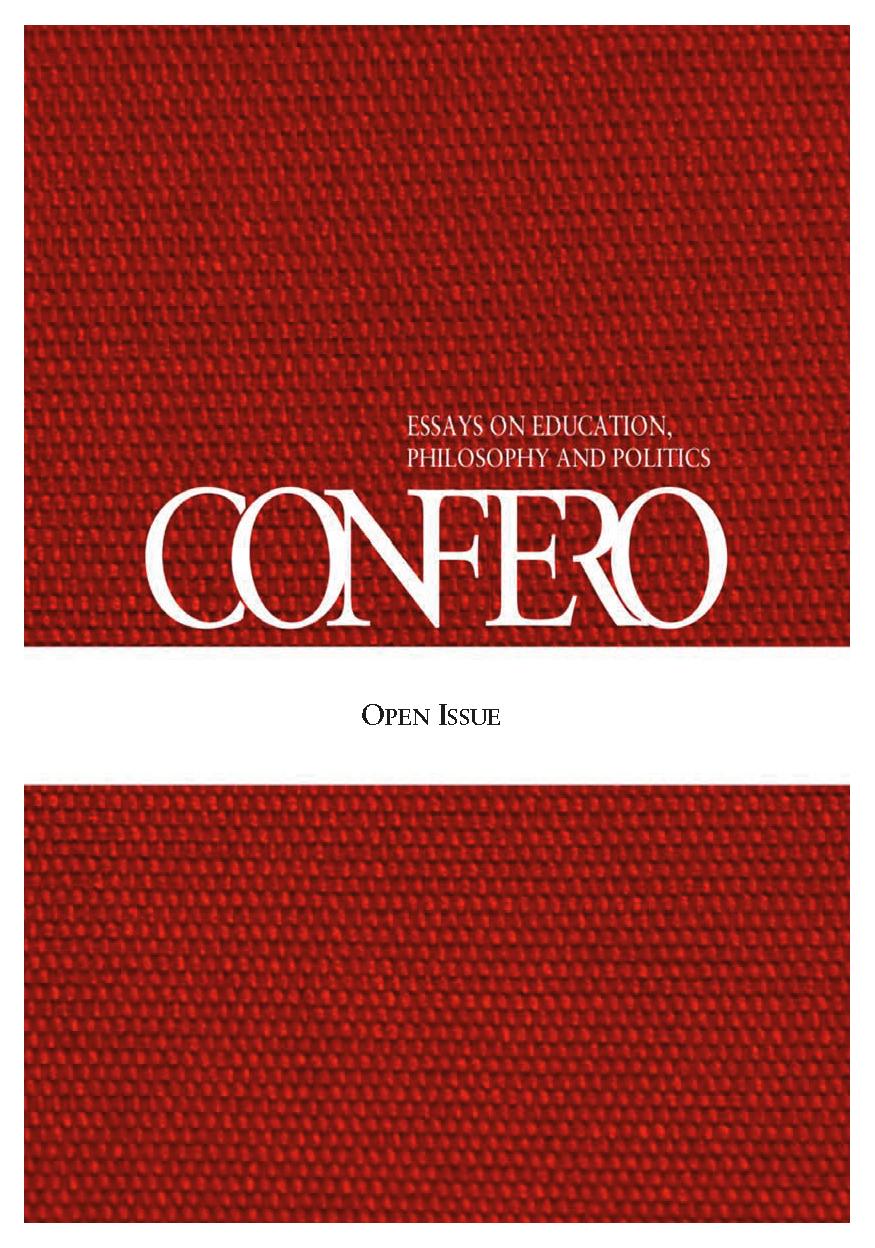Bildung and the road from a classical into a global and postcolonial concept
DOI:
https://doi.org/10.3384/confero.2001-4562.140604bAbstract
In this article the author shows how a European classical form of bildung has developed in our time into a postcolonial, or a new global form of bildung.
The main components of the concept of bildung are described as well as a suggestion of what we can mean by the postcolonial. Thereafter the author elaborate on the relationship between the universal and the particular and discusses what we can mean by a global concept of bildung.
References
Aman, Robert. Impossible Interculturality? Education and the Colonial Difference in a Multicultural World. Linköping: Linköping University, 2014. doi: 10.3384/diss.diva-106245
Appiah, Kwame Cosmopolitanism: Ethics in a World of Strangers. New York: W.W. Norton, 2006.
Beauvoir, Simone. The second sex Beck, Ulrich. Der Kosmopolitische Blick – oder: Krieg und Frieden. Frankfurt am Main: Suhrkamp , 2004.
Benhabib, Seyla. The Claims of Culture: Equality and Diversity in the Global Era. Princeton: Princeton University Press, 2002.
Benhabib, Seyla. Another Cosmopolitanism. Oxford: Oxford University Press, 2006. doi: 10.1093/acprof:oso/9780195183221.001.0001
Bhabha, Homi. The Location of Culture. London: Routledge, 1994.
Chakrabarty, Dipesh. Provincializing Europe: Postcolonial Thought and Historical Difference, New ed. Princeton: Princeton University Press, 2008.
Conrad, Joseph. Heart of Darkness. London: Blackwood, 1902.
Damrosch, David. What is World Literature? Princeton: Princeton University Press, 2003.
Fanon, Frantz. Peau Noir, Masques Blancs. Paris: Editions du Seuil, 1971.
Gadamer, Hans-Georg. Truth and Method. London: Sheed and Ward, 1985.
Gustavsson, Bernt & Osman, Ali. “Multicultural Education and Lifelong Learning” in Globalization, Education and Training. Impacts and Issues, ed. S Walters. London: Zed Books, 1997. 179–187.
Gustavsson, Bernt “Negotiating the Space for Democracy Between the Universal and the Particular: The Role of Phronesis”. In Democracy and Human Rights in Education and Society: Explorations from South Africa and Sweden, eds. Chaterine Odora Hoppers, Bernt Gustavsson, Enver Motala, John Pampallis Örebro: Örebro University 2007. 67–87.
Gustavsson, Bernt. “Bildung, Ubuntu and the Problem of Difference and Unity”. In Altering politics: Democracy from the Legal, Educational, and Social Perspectives. Eds. Jan-Magnus Enelo, Katarzyna Jezierska, Bernt Gustavsson, Örebro, Örebro University, 2010. P25–39
Gustavsson, Bernt “The Idea of Democratic Bildung: Its Transformation in Space and Time”In Popular Education, Power and Democracy, eds. Laginder, Nordvall, Crowther. Leicester: NIACE. 2013.
Habermas, Jürgen. “Further Reflections on the Public Sphere”. In Habermas and the Public Sphere, ed. Calhoun, C. Cambridge. MA: MIT Press, 1992. 421–461.
Hegel, Georg Wilhem Friedrich.Phenomenology of Spirit. Oxford: Oxford University Press, 1977, (1807).
Jezierska, Katarzyna. Radical Democratic Redux: Politics and Subjectivity Beyond Habermas and Mouffe. Örebro: Örebro University. 2011.
Jonsson, Stefan. “Essay on a Novel by Kafka”. In The Transformation of Bildung. Gustavsson, B. ed. Göteborg: Daidalos. 2007.p.
Joyce, James. Ulysses. Paris: Silvia Beach.2008 1922.
Kemp, Peter. Citizen of the World, Cosmopolitan Ideals for the 21st Century. Amherst, NY: Humanity Books. 2010.
Mandela, Nelson. The Long Walk to Freedom. London: Little, Brown & Company.1994.
Meer, Nasar & Tariq Modood, How Does Interculturalism Contrast with Multiculturalism? Journal of Intercultural Studies, 33: 2 (2012) 175–196. doi: 10.1080/07256868.2011.618266
Mudimbe, Valentin-Yves. The Idea of Africa. Bloomington, IN: Indiana University Press, 1994.
Paul, Samuel A. The Ubuntu God, Deconstructing a South African Narrative of Oppression, Princeton: Princeton Theological Monograph. 2009.
Nussbaum, Martha C. Cultivating humanity: A Classical Defense of Reform in Liberal Education., Princeton: Princeton University Press. 2002.
Ricoeur, Paul. Time and Narrative. Chicago: Chicago University Press. 1982.
Ricoeur, Paul. Oneself as Another. Chicago: Chicago University Press. 1992.
Said, Edward. Orientalism. New York: Pantheon Books. 1978.
Said, Edward. Representation of the Intellectual. New York: Vintage Books. 1996.
Salih, Tayeb. Season of Migration to the North. Oxford: Heinemann Press. 1969.
Sen, Amartya. Development as Freedom. New York: Knopf. 1999.
Serequeberhan, Tsenay, ed.) Philosophy. The Essential Readings. New York: Paragon House, 1991.
Spivak, Gayatri, Outside in the Teaching Machine, New York: Routledge. 1993.
Suttner, Raymond. “Africanisation”: African Identities and Emancipation in Contemporary South Africa. Social Dynamics 36.3 (2010): 515–530. doi: 10.1080/02533952.2010.517624
Tutu, Desmond. No future Without Forgiveness. London: Rider. 2000.
Wallerstein, Immanuel European Universalism: The Rhetoric of Power. New York: New Press. 2006
Downloads
Published
Issue
Section
License
Copyright (c) 2014 Bernt Gustavsson

This work is licensed under a Creative Commons Attribution 4.0 International License.
As Confero is an open access journal, this means that anyone who can access the Internet can freely download and read the journal. There are no commercial interests for Linköping University Electronic Press or Confero in publishing the journal.
The core idea of open access is that copyright remains with the author(s). However, we publish with the agreement of the author that if she or he decides later to publish the article elsewhere, that the publisher will be notified, prior to any acceptance, that the article has already been published by Confero.
When publishing with Confero, it is with the agreement of the author that if they make their article available elsewhere on the internet (for example, on their own website or an institutional website), that they will do so by making a link to the article as published in Confero using the Digital Object Identifier (DOI) number of the article and acknowledge in the text of the site that the article has been previously published in Confero.
As evident by the markers on our homepage, Confero falls under the Creative Commons licence abbreviated BY. This means that we allow others to use, spread and elaborate on the published articles, as long as they acknowledge who published it and where it was originally published.



